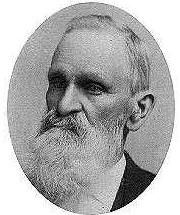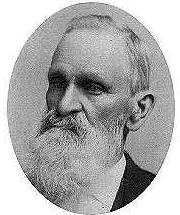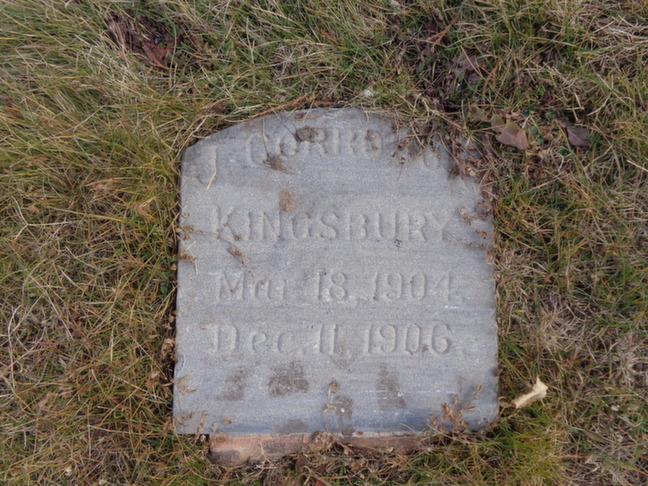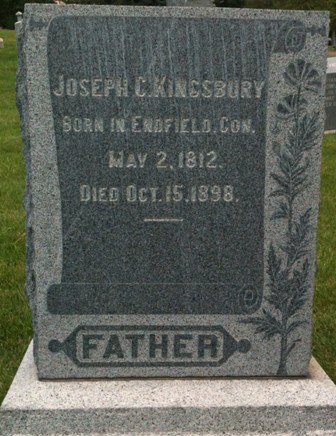Married Caroline Whitney, 3 Feb 1836, Kirtland, Lake, Ohio
Married Sarah Ann Whitney, 29 Apr 1843, Nauvoo, Hancock, Illinois
Married Dorcas Adelia Moore, 4 Mar 1845, Nauvoo, Hancock, Illinois
Married Loenza Alcina Pond, 26 Jan 1846, Nauvoo, Hancock, Illinois
Married Eliza Mary Partridge, 26 Sep 1870, Salt Lake City, Salt Lake, Utah
History - A High Councilor at Kirtland, an assistant to the Trustee-in-trust at Nauvoo, and one of the early Bishops in Utah, Joseph C. Kingsbury was a historical character in the midst of his people, the Latter-day Saints. He will best be remembered by the present generation for his extended connection with and superintendency of the General Tithing Store at Salt Lake City.
He was a native of Connecticut, born at Endfield, in Hartford county, on the 2nd of May 1812. His father's name was Solomon Kingsbury, and his mother's maiden name Bashebe Peas. On his mother's side he was descended from Governor Bradford, and on his father's, from one of two Kingsbury brothers who landed at Salem, Massachusetts, in John Winthrop's company, in 1630. He was but a year old when his parents moved to Painesville, Ohio, and but two years of age when his mother died, leaving four children, himself the youngest. His father, who was a farmer, a merchant and for some time County Judge, died when Joseph was nineteen.
The days of his youth were partly spent on a farm. At sixteen he went to work on his own account, superintending the weighing of ore and coal for the Geauga Iron Company. In the fall of 1830 he clerked in a merchant's store at Ashtabula. He left there in the fall of 1831, and after assisting his brother, who was in business at Chagrin, returned to Painesville. In December of the same year he went to Kirtland, where he was employed first by a Mr. Knight, and afterwards by Newel K. Whitney, whom he had known for some years, and who was then a Mormon merchant and the Bishop of Kirtland.
From Bishop Whitney and his wife young Kingsbury heard much of Mormonism, and soon he was converted to the faith, becoming a member of the Church of Jesus Christ of Latter-day Saints January 15, 1832. He was ordained an Elder July 23, 1833, being one of twenty-four Elders chosen to lay the cornerstones of the Kirtland Temple on that day. His ordination as a High Priest came in November. 1835, when on the 13th of that month he was made a High Councilor of the Kirtland Stake of Zion. Meantime he had been clerking in Bishop Whitney's store.
He now took a mission to the Eastern States, laboring in New York for about three months and then returning to Kirtland, where he again worked for Bishop Whitney, whose relative, Caroline Whitney, he married, February 3, 1836. Their first child, a son named Joseph W., was born February 13, 1837, but died August 13, 1838, while the family were on the way to Missouri. There they passed through the tribulations that came upon their people, and next resided successively at Quincy, Illinois, and Montrose, Iowa. In 1841 they became residents of Nauvoo.
Bishop Whitney was agent at this time for the Prophet Joseph Smith, having charge of his store, and Mr. Kingsbury was his assistant. On the 16th of October, 1842, his wife died. In July following he went upon a mission to the Eastern States, laboring among his relatives, as well as the people generally, and returning to Nauvoo, in company with Horace K. Whitney, a month after the murder of the Prophet. In November, 1844, Mr. Kingsbury was again engaged by Bishop Whitney, who was acting as Trustee-in-trust for the Church. In 1843, prior to going upon his mission, he had copied for the Bishop the original manuscript of the revelation on celestial marriage, which had been written by William Clayton at the Prophet's dictation. Thus it happened that when the original was destroyed, an exact copy was in existence, in the handwriting of Joseph C. Kingsbury. On November 22, 1845, he married Dorcas A. Moor.
In the exodus of February, 1846, he traveled with Bishop Whitney to the Missouri river, where in the ensuing summer, when the general emigration was organized, he and his family became part of A. O. Smoot's hundred and George B. Wallace's fifty. Thus they came to Salt Lake valley, arriving here on the 29th of September.
Mr. Kingsbury, after residing for a year and a half in the "Old Fort," which he had helped to build, moved on to his lot in the Second Ward of Salt Lake City. He acted for a while as a counselor to John Lowry, the Bishop of the Ward, but on July 13, 1851, he succeeded Lowry in that position. In October, 1852, he moved to Ogden and afterwards to East Weber, from which place he proceeded to Prove in the general move of 1858. In September of the same year Salt Lake City became his permanent home.
In 1860 began his long connection with the General Tithing Store, of which in 1867 he was made superintendent. There he was under the direction of Presiding Bishop Edward Hunter, with whom he was as much in favor as he had been with Bishop Whitney, Hunter's predecessor. January 25, 1883, was the date of his ordination as a Patriarch. He remained superintendent of the Tithing Office up to within a few years of his death, and was then given a position at the Salt Lake Temple. He died October 15, 1898.
Joseph C. Kingsbury was a man of blameless life and of the strictest integrity. He was trusted as few men were by the Prophet Joseph Smith, and was equally loyal to his successors. He had a conservative, constant, gentle nature, was fervent in his religion, yet charitable and liberal to all men, was fearless in spirit and faithful in the discharge of every duty. A frontiersman during the first half of his life, he received little schooling, but he was interested in education, and did all he could for his children in that direction. He was the father of President Joseph T. Kingsbury, of the University of Utah, a man who bids fair to be as widely known and as deservedly esteemed as his deceased sire.
Orson F. Whitney, History of Utah, Vol. 4, p. 114
Married Caroline Whitney, 3 Feb 1836, Kirtland, Lake, Ohio
Married Sarah Ann Whitney, 29 Apr 1843, Nauvoo, Hancock, Illinois
Married Dorcas Adelia Moore, 4 Mar 1845, Nauvoo, Hancock, Illinois
Married Loenza Alcina Pond, 26 Jan 1846, Nauvoo, Hancock, Illinois
Married Eliza Mary Partridge, 26 Sep 1870, Salt Lake City, Salt Lake, Utah
History - A High Councilor at Kirtland, an assistant to the Trustee-in-trust at Nauvoo, and one of the early Bishops in Utah, Joseph C. Kingsbury was a historical character in the midst of his people, the Latter-day Saints. He will best be remembered by the present generation for his extended connection with and superintendency of the General Tithing Store at Salt Lake City.
He was a native of Connecticut, born at Endfield, in Hartford county, on the 2nd of May 1812. His father's name was Solomon Kingsbury, and his mother's maiden name Bashebe Peas. On his mother's side he was descended from Governor Bradford, and on his father's, from one of two Kingsbury brothers who landed at Salem, Massachusetts, in John Winthrop's company, in 1630. He was but a year old when his parents moved to Painesville, Ohio, and but two years of age when his mother died, leaving four children, himself the youngest. His father, who was a farmer, a merchant and for some time County Judge, died when Joseph was nineteen.
The days of his youth were partly spent on a farm. At sixteen he went to work on his own account, superintending the weighing of ore and coal for the Geauga Iron Company. In the fall of 1830 he clerked in a merchant's store at Ashtabula. He left there in the fall of 1831, and after assisting his brother, who was in business at Chagrin, returned to Painesville. In December of the same year he went to Kirtland, where he was employed first by a Mr. Knight, and afterwards by Newel K. Whitney, whom he had known for some years, and who was then a Mormon merchant and the Bishop of Kirtland.
From Bishop Whitney and his wife young Kingsbury heard much of Mormonism, and soon he was converted to the faith, becoming a member of the Church of Jesus Christ of Latter-day Saints January 15, 1832. He was ordained an Elder July 23, 1833, being one of twenty-four Elders chosen to lay the cornerstones of the Kirtland Temple on that day. His ordination as a High Priest came in November. 1835, when on the 13th of that month he was made a High Councilor of the Kirtland Stake of Zion. Meantime he had been clerking in Bishop Whitney's store.
He now took a mission to the Eastern States, laboring in New York for about three months and then returning to Kirtland, where he again worked for Bishop Whitney, whose relative, Caroline Whitney, he married, February 3, 1836. Their first child, a son named Joseph W., was born February 13, 1837, but died August 13, 1838, while the family were on the way to Missouri. There they passed through the tribulations that came upon their people, and next resided successively at Quincy, Illinois, and Montrose, Iowa. In 1841 they became residents of Nauvoo.
Bishop Whitney was agent at this time for the Prophet Joseph Smith, having charge of his store, and Mr. Kingsbury was his assistant. On the 16th of October, 1842, his wife died. In July following he went upon a mission to the Eastern States, laboring among his relatives, as well as the people generally, and returning to Nauvoo, in company with Horace K. Whitney, a month after the murder of the Prophet. In November, 1844, Mr. Kingsbury was again engaged by Bishop Whitney, who was acting as Trustee-in-trust for the Church. In 1843, prior to going upon his mission, he had copied for the Bishop the original manuscript of the revelation on celestial marriage, which had been written by William Clayton at the Prophet's dictation. Thus it happened that when the original was destroyed, an exact copy was in existence, in the handwriting of Joseph C. Kingsbury. On November 22, 1845, he married Dorcas A. Moor.
In the exodus of February, 1846, he traveled with Bishop Whitney to the Missouri river, where in the ensuing summer, when the general emigration was organized, he and his family became part of A. O. Smoot's hundred and George B. Wallace's fifty. Thus they came to Salt Lake valley, arriving here on the 29th of September.
Mr. Kingsbury, after residing for a year and a half in the "Old Fort," which he had helped to build, moved on to his lot in the Second Ward of Salt Lake City. He acted for a while as a counselor to John Lowry, the Bishop of the Ward, but on July 13, 1851, he succeeded Lowry in that position. In October, 1852, he moved to Ogden and afterwards to East Weber, from which place he proceeded to Prove in the general move of 1858. In September of the same year Salt Lake City became his permanent home.
In 1860 began his long connection with the General Tithing Store, of which in 1867 he was made superintendent. There he was under the direction of Presiding Bishop Edward Hunter, with whom he was as much in favor as he had been with Bishop Whitney, Hunter's predecessor. January 25, 1883, was the date of his ordination as a Patriarch. He remained superintendent of the Tithing Office up to within a few years of his death, and was then given a position at the Salt Lake Temple. He died October 15, 1898.
Joseph C. Kingsbury was a man of blameless life and of the strictest integrity. He was trusted as few men were by the Prophet Joseph Smith, and was equally loyal to his successors. He had a conservative, constant, gentle nature, was fervent in his religion, yet charitable and liberal to all men, was fearless in spirit and faithful in the discharge of every duty. A frontiersman during the first half of his life, he received little schooling, but he was interested in education, and did all he could for his children in that direction. He was the father of President Joseph T. Kingsbury, of the University of Utah, a man who bids fair to be as widely known and as deservedly esteemed as his deceased sire.
Orson F. Whitney, History of Utah, Vol. 4, p. 114
Family Members
-
![]()
Bashua Dorcas Kingsbury Fryer
1847–1937
-
![]()
Vilate Elizabeth Kingsbury Snelgrove
1849–1884
-
![]()
Martha Ann Kingsbury Lewis
1850–1950
-
![]()
Maria Loenza Kingsbury Merrill
1852–1925
-
![]()
Mary Ophelia Kingsbury Meservy
1852–1939
-
![]()
Joseph Thomas Kingsbury
1853–1937
-
![]()
Elizabeth Kingsbury Druce
1855–1955
-
![]()
Annis Leah Kingsbury
1859–1932
-
![]()
Solomon Seth Kingsbury
1861–1933
-
![]()
Melvina Kingsbury
1866–1867
-
![]()
Frances Eliza Warren Kingsbury Taylor
1870–1952
-
![]()
Carrie Maud Kingsbury
1875–1926
-
![]()
Rhoda P. Kingsbury Lovesy
1877–1946
-
![]()
Roy Partridge Kingsbury
1880–1927
Advertisement
Explore more
Sponsored by Ancestry
Advertisement

























